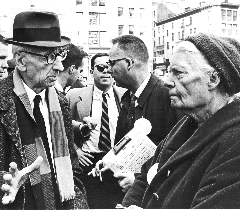Chapter 1
Preface
Pages 1-2-3
-
Chapter 2
Lessons
Pages 4-5-6
-
Chapter 3
Values
Pages 7-8-9
-
Chapter 4
Anger
Pages 10-11-12
-
Chapter 5
Action
Pages 13-14-15
-
Chapter 6
Affiliation
Pages 16-17-18
-
Chapter 7
Integration
Pages 19-20-21
-
Chapter 8
World-Historic Consciousness
Pages 22-23-24-25-26
-
Chapter 9
Universality
Page 27
-
Chapter 10
Root Causes
Pages 28-29-30
-
Chapter 11
The New Psychology
Pages 31-32-33
-
Acknowledge-
ments
Page 37
To sustain action and affiliation, these steps must be integrated with an activist's other social relations, including family, friendships, and means of earning a living. The question of personal integration is especially important because it enables an activist to sustain a lifetime of involvement and to avoid the danger of burnout.
The danger of burnout is especially great for peace and justice activists because more than others, they are confronted by deliberate pressures from the forces of militarism and exploitation. These pressures can be overwhelming such as those that led to the assassination of Martin Luther King, Jr. Most major peace activists have been under attack by the police and mass media, and many have been sent to prison at one time or another. The pressure intensifies at certain periods of history: thus, for example, it is not accidental that during World War I when Eugene Victor Debs, Dorothy Day and Bertrand Russell were imprisoned and Emily Balch and A.J. Muste lost their jobs, that Debs, Day, Russell, and Jane Addams all had physical and nervous breakdowns.
 |
A.J. Muste and Dorothy Day join in a draft-card burning to protest the war in Vietnam: "We must have a community, a group, an exchange with others." |
Sustaining a lifetime of personal action and involvement requires a network of social support. Thus, for example, despite the great pressures against him, Martin Luther King Jr. was able to sustain his work with the help of his "ground crew." This included not only his wife Coretta and the rest of his immediate family, but also their church, the Ebenezer Baptist in Atlanta:
His wonderful Ebenezer family had encouraged him and given him and his organization unstinted support during all the difficult years of his struggle. They were truly what he referred to as "the ground crew." Without them doing their job in the background, in a very big way, he could not have given to the nation and the world the kind of leadership he did.
In many ways, King's "ground crew" was ideal. In addition to the new support he obtained for civil rights action in the Montgomery community, not to mention around the world, he could integrate this with a loving and supportive family, a salary from the church, and the support of his past activities (academic work) and affiliations (the church). However, they did not all immediately support his broadening the commitment to oppose the war in Vietnam, and for that support it was necessary for him and Coretta to struggle.
Eugene Victor Debs was able to sustain his lifelong commitment with the support of a network similar to King's "ground crew." As biographer Ray Ginger points out, the following description by Debs of his wife's support could also describe the support from his parents, his brother Theodore, and his brother-in-law Arthur Baur:
She shared what came in stormy days without complaint, and when I returned after many weeks of weary travel she had the home sweet and cozy and ministered to me in all tenderness until I was rested and refreshed for another journey....For years she was our secretary of state. She wrote all my letters in long hand before the days of the typewriter, and I had a large correspondence. She trudged through the snow to a cold office when I was out on the road, lighted the fire, emptied the ashes, cleaned the office, answered the mail, shipped bundles of literature to me and to others, and then returned to cook her meals, set the house in order, and attend to the wants of the home.
For Debs, like King, the key question was whether the support network continued to support him when he broadened the scope of his commitment from trade unionism to socialism around 1896 and again to his opposition to World War I in 1917. According to the Ginger biography the immediate family of Debs, as well as many of his trade union comrades, supported his move to socialism. But when he opposed World War I, he found himself without such support, which may help to explain why he was "hesitant and floundering," in "ill-health," and "groping in the dark," in the months before he gave his famous anti-war speech in Canton, Ohio, for which he was arrested, tried and imprisoned.
(continued on next page)
 |
 |
 |